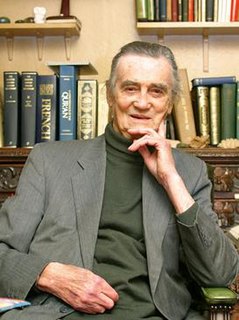A Quote by Lloyd Alexander
For the deeds of a man, not the words of a prophecy, are what shape his destiny.
Related Quotes
Prophecy and prescience - How can they be put to the test in the face of unanswered questions? Consider: How much is actual prediction and how much is the prophet shaping the future to fit the prophecy? What are the harmonics inherent in the act of prophecy? Does the prophet see the future or does he see a line of weakness, a fault or cleavage that he may shatter with words or decisions as a diamond-cutter shatters his gem with a blow of the knife?
Destiny ... a word which means more than we can find any definitions for. It is a word which can have no meaning in a mechanical universe: if that which is wound up must run down, what destiny is there in that? Destiny is not necessitarianism, and it is not caprice: it is something essentially meaningful. Each man has his destiny, though some men are undoubtedly "men of destiny" in a sense in which most men are not.
Tragedy dramatizes human life as potentiality and fulfillment. Its virtual future, or Destiny, is therefore quite different from that created in comedy. Comic Destiny is Fortune - what the world will bring, and the man will take or miss, encounter or escape; tragic Destiny is what the man brings, and the world will demand of him. That is his Fate.
Certain mystical philosophers have personified Destiny, and from this point of view each man's personal destiny is his archetype or "other self"--his "angel"--with whom he must be reunited if he is to rise above his fragmentary identity as a worldling and become whole, as he is (and always has been) in the mind of God.


































